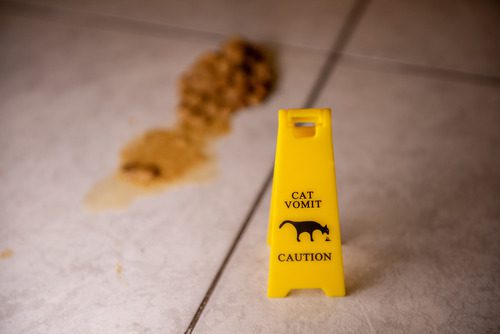My Cat Keeps Throwing Up But Seems Fine: Should I Worry?
It’s unsettling to find vomit on the floor and realize your cat has been throwing up when they act completely normal otherwise. They’re eating, playing, purring, and behaving like their usual self. So, what gives? If you’ve been searching “My cat keeps throwing up but seems fine,” you’re not alone. Many cat owners face this confusing scenario. Even if your cat appears to be in good spirits, repeated vomiting could signal an underlying issue that warrants attention. This blog will explore what might be causing this behavior, how to tell the difference between normal and abnormal vomiting, and when it’s time to bring your cat to Warrick Veterinary Clinic for a checkup. For questions or to schedule an exam, call us today at (812) 897-4855.

Occasional Hairballs vs. Frequent Vomiting
Cats groom themselves constantly, and hairballs are often the result. But how can you tell if what your cat is throwing up is just a hairball or something more concerning?
What Hairballs Look Like
Hairballs are typically tubular in shape and composed of fur. They may contain a small amount of fluid or bile, but they usually don’t involve undigested food. If your cat throws up a hairball once every couple of weeks, this is generally considered normal especially for long-haired breeds.
Vomiting More Than Once a Week May Not Be Normal
If your cat is vomiting more frequently than once a week, even if they seem fine otherwise, it’s a good idea to check in with your veterinarian. Repetitive vomiting could point to gastrointestinal irritation, dietary intolerance, or more serious internal concerns.
What Causes Chronic Vomiting in Cats?
When pet owners search “My cat keeps throwing up but seems fine,” they’re often trying to understand whether it’s safe to wait things out or if it’s time to act. There are several potential causes for chronic vomiting that don’t always cause obvious distress in cats.
Dietary Issues and Food Sensitivities
Cats can develop sensitivities to certain ingredients in their food, even if they’ve been eating the same formula for months or years. Some cats have trouble digesting certain proteins or grains, while others may react poorly to food additives or preservatives. Vomiting that occurs shortly after meals could be linked to what your cat is eating.
Eating Too Quickly
Some cats eat their food so fast that it comes right back up. This is known as regurgitation, and it differs from true vomiting because it’s a passive process and usually happens within minutes of eating. You may even find whole, undigested pieces of kibble.
Parasites or Mild Infections
Even indoor cats can develop parasites or minor infections that upset their stomach. While these might not make a cat feel obviously ill, they can cause intermittent vomiting. A fecal exam may help rule out these possibilities.
Stress and Environmental Changes
Cats can be sensitive to changes in their environment. Moving homes, introducing new pets, or even rearranging furniture can lead to stress-related gastrointestinal upset. In some cases, vomiting can be a sign of stress even if your cat is acting normal in other ways.
Is It Vomiting or Something Else?
Not all messes on your floor are the result of vomiting. Identifying what’s really going on can help guide your next steps.
Vomiting vs. Coughing
Coughing can sometimes resemble vomiting, especially if your cat is crouching and gagging. Coughing may indicate respiratory issues such as asthma or bronchitis. Unlike vomiting, there won’t be much (if any) stomach content present.
Vomiting vs. Regurgitation
As mentioned earlier, regurgitation is usually quick and effortless, occurring soon after eating. Vomiting, on the other hand, involves heaving and retching and can happen at any time, not just after meals. Noticing these differences can help your veterinarian make a more accurate diagnosis.
When Vomiting Becomes a Red Flag
While your cat may seem perfectly fine after throwing up, repeated episodes over time can lead to dehydration, weight loss, and other complications. Call Warrick Veterinary Clinic at (812) 897-4855 if your cat:
- Vomits more than once per week
- Has visible blood in their vomit
- Loses weight unexpectedly
- Shows changes in appetite or behavior
- Begins vomiting after a diet change
- Has trouble keeping food down after every meal
These symptoms may indicate a more serious condition, such as inflammatory bowel disease, hyperthyroidism, or gastrointestinal lymphoma.
How Your Warrick Veterinarian Can Help
Your veterinarian can help determine why your cat keeps throwing up despite appearing healthy. A physical exam, along with diagnostic tools, will offer insight into what’s happening internally.
Physical Exam and History
Your vet will perform a thorough physical exam and ask about your cat’s eating habits, vomiting frequency, and other symptoms. They’ll also consider factors like age, breed, and lifestyle.
Diagnostic Testing
Depending on your cat’s condition, testing might include:
- Blood work to assess organ function
- Fecal testing for parasites
- Imaging such as X-rays or ultrasound
- Food trials to evaluate for dietary intolerance
These tests help identify the root cause of your cat’s vomiting and guide appropriate treatment or management plans.
Don’t Ignore a Pattern Even If Your Cat Acts Normal
Vomiting in cats is easy to brush off, especially when your pet bounces right back and seems unaffected. But if your cat keeps throwing up, even if they look and act fine, something more may be going on beneath the surface. Cats often hide signs of illness, which makes it even more important to recognize patterns and follow up with your veterinarian when needed.
If you’ve noticed your cat vomiting more often than usual, call Warrick Veterinary Clinic in Warrick County, IN today at (812) 897-4855 to schedule a visit. Let’s work together to make sure your cat stays healthy, happy, and feeling their best.
